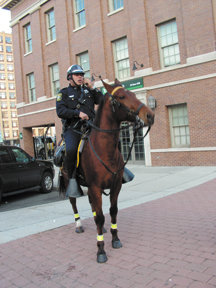Not now. The City Council made it clear on Wednesday night that Hoboken has to be frugal with its police force in the current economic climate.
The council voted unanimously against the proposed police contracts that had been negotiated over the last year by state appointed fiscal monitor Judy Tripodi. The contracts offered an average of 3.1 percent raises each year, or 12.4 percent over the total of the contract, which applies from 2008 through 2012.
Thus, two years of the contract would be applied retroactively.
The vote was 7-0. Council members Michael Russo and Theresa Castellano both have family members in the Police Department, so they did not vote due to a conflict of interest.
The deals were negotiated months ago by Tripodi, who admitted recently to the Reporter that the climate for labor negotiations has changed since then.
Leverage in negotiations is shifting away from the unions state-wide, and last week, Gov. Christopher Christie announced major cuts in state aid to towns and schools for next year.
“No one I know is making more money than they were two years ago.” – Scott Siegel
________
The fact that the council even held a vote on the contracts is proof of the shift. In February, Tripodi drafted a memo informing Mayor Dawn Zimmer and Council President Peter Cunningham that she would sign off on the contracts unilaterally on behalf of the city. However, Zimmer petitioned the new state administration to step in on behalf of the city.
The state essentially redefined Tripodi’s job, removed her from the negotiations, and put the power to approve or deny the contracts back in the hands of the City Council.
The new state leadership also released the results of a police audit that the city had been seeking for months. The audit makes recommendations for contract issues – like extending the work week to 40 hours – that were not addressed in Tripodi’s proposal.
Residents chime in
Several residents had asked the council to vote down the two police contracts – one for the rank-and-file officers and another for police brass – and restart negotiations.
“What is so special about the uniformed services?” asked resident Helen Hirsch at the meeting. “Why are they not sharing the pain with the rest of us? Why should they have retroactive pay raises?”
Scott Siegel said, “No one I know is making more money than they were two years ago.”
Phil Cohen told the council that voting against a police union was an issue of “political courage,” especially in a town where union leaders and other officials openly take sides in local elections. “I sympathize with you, and I urge you to be strong…Damn the consequences,” he said.
Resident Rami Pinchevsky asked the council to table the vote until they understood the financial impact of the proposed contract.
“I don’t know what any of this means in terms of cost,” he said.
But Perry Belfiore spoke on behalf of the police, who he noted were honored after their service during the 9/11 tragedy. He said the city had forgotten their service already.
“The public is very fickle,” he said. “It has a short attention span.”
Council sounds off
The council first discussed the proposal in closed session before speaking on the issue during the public vote.
Councilman Ravi Bhalla, who chairs the Public Safety committee, said, “The contract was reasonable six months ago.”
The police unions can file for arbitration, but as Councilman Nino Giacchi said, “nobody knows the financial consequences [of arbitration].”
Councilwoman Beth Mason called Tripodi’s process of negotiating the contracts “secretive.”
Council President Peter Cunningham also disagreed with how the process was handled by Tripodi. “She felt she was doing what was in the best interest of the city and the taxpayer, and I felt differently,” he said. He said he felt there were very few givebacks for the city.
A few of the councilpersons, as well as Zimmer, expressed their wishes to go back to the negotiating table as soon as possible, but the police unions didn’t seem open to the idea last week.
Police reaction
Vincent Lombardi, president of the patrolman’s union, said, “I will not sit down and negotiate any longer with this city.”
He said the union will “almost definitely” file for arbitration, and he said the union is considering legal action on breach of contract. Lombardi thinks arbitration will award the officers more than the contract would have.
The contract terms that the council voted down were fair, he said. Although the unions wanted larger pay raises, they were giving up several special days off for religious ceremonies and the like, a factor that had been criticized in a state report last year.
They also gave concessions on prescription plan co-pays.
“It’s just politics; it’s bad business,” he said. “I think it’s a big mistake.”
Timothy J. Carroll may be reached at tcarroll@hudsonreporter.com.
